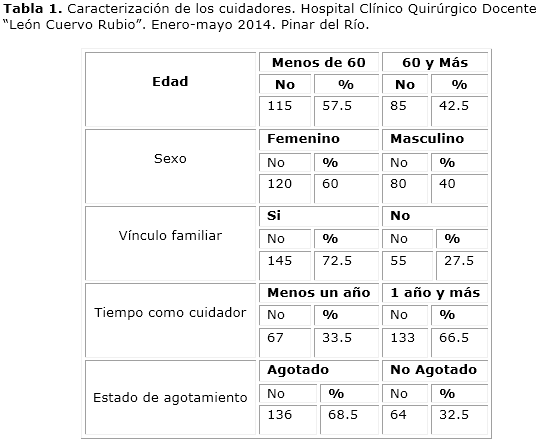Ethical repercussions of the caregiver-burnout on the elderly's quality of life
Keywords:
Caregivers, Quality of life, Aged.Abstract
Introduction: population ageing requires of changes in people’s habits and training for caregivers, in order to improve the quality of life of the elderly and of those who care for them.Objective: to determine the impact of caregiver burnout in the quality of life of the elderly.
Material and method: this research was carried out at Dr. León Cuervo Rubio Provincial General Hospital in Geriatric and Gerontology Service, during January-May 2014. It is a descriptive, observational and cross-sectional research. The target group was comprised of 300 patients attending to the mentioned service during this period of time, some of them hospitalized and other from outpatient offices where all of them were assessed by the specialists, a sample taken at random of 200 patients meeting the inclusion criteria was chosen, considering the medical ethics.
Results: the relationship existing between the elderly quality of life and the caregivers’ degree of exhaustation was demonstrated, finding a directly proportional correlation; caregiver’s burnout implies lower quality of life in the elderly.
Conclusions: a greater quantity of female caregivers was found concerning the characterization of the sample, family ties, more than a year as caregivers and most of them were 60 years old and older, 68.5% of the sample showed signs of burnout, as well. The quality of life of elderly care was mostly low and medium.
Downloads
References
1. Bayarre Vea HD, Pérez Piñero JS, Menéndez Jiménez J, Tamargo Barbeito TO, Morejón Carralero A, Díaz Garrido D, et al. Prevalencia de discapacidad mental en adultos mayores en cinco provincias de Cuba, 2000-2004. Rev Cubana Salud Pública[Internet]. 2008[citado 2008 dic 13]; 34(3): [aprox.2p]. Disponible en: http://scielo.sld.cu/scielo.php?script=sci_arttext&pid=S0864-34662008000300002&lng=es&nrm=iso&tlng=es
2. Bayarre Vea HD, Pérez Piñero J, Menéndez Jiménez J. Las transiciones demográfica y epidemiológica y la calidad de vida objetiva en la tercera edad. Rev Gero Info[Internet]. 2006[citado 2011 ene 12]; 1(3): [aprox. 3p.]. Disponible en: http://www.sld.cu/galerias/pdf/sitios/gericuba/
las_transiciones_demografica_y_epidemiologica_y_la_calidad_de_vida_objetiva_en_la_tercera_edad.pdf
3. Cuba. MINSAP. Dirección Nacional de Registros Médicos y Estadísticas de Salud. Anuario Estadística de Salud 2011. La Habana: MINSAP; abril 2012.
4. Selin-Ganén M, del-Valle-Pérez M. Caracterización de ancianos frágiles y sus cuidadores. Medisur[Internet]. 2012[citado 2015 abr 21]; 10(3): [aprox. 4 p.]. Disponible en: http://www.medisur.sld.cu/index.php/medisur/article/view/2204
5. Espín Andrade AM. Factores de riesgo de carga en cuidadores informales de adultos mayores con demencia. Rev. cub. salud pública[Internet]. 2012 sep[citado 2015 abr 21]; 38(3): [aprox 8 p]. Disponible en: http://www.scielosp.org/scielo.php?script=sci_arttext&pid=S0864-34662012000300006
6. Flores N, Jenaro C, Moro L, Tomşa R. Salud y calidad de vida de cuidadores familiares y profesionales de personas mayores dependientes: estudio comparativo. European Journal of investigation in health, psychology and education[Internet]. 2014[citado 2015 Abr 22]; 4(2): [aprox 3 p]. Disponible en: http://ejihpe.es/index.php/journal/article/view/55
7. Rodríguez R CR, Díaz RL CG, Macias EQ. Estilo de vida y autopercepción sobre salud mental en el adulto mayor. Medisan[Internet]. 2014[citado 2015 abr 22]; 18(1): [aprox 1p]. Disponible en: http://www.medigraphic.com/pdfs/medisan/mds-2014/mds141i.pdf
8. Baster Moro JC. Adultos mayores en funciones de cuidadores de ancianos. Revista Cubana de Salud Pública[Internet]. 2012[citado 2015 abr 22]; 38(1): [aprox 3 p]. Disponible en: http://www.revsaludpublica.sld.cu/index.php/spu/article/view/241
9. Bartolo D. Evaluación del maltrato en el adulto mayor en la unidad de geriátrica "Carlos Fragachan". Ciudad Bolivar: Venezuela; 2009. Disponible en: http://www.ilustrados.com/tema/1697/Evaluacion-maltrato-adulto-mayor-unidad-geriatrica.html
10. Valer DB, Aire M, Fengler FL. Adaptación y validación del Inventario de Sobrecarga del Cuidador para uso en cuidadores de ancianos. Rev Latino-Am[Internet]. 2015[citado 2015 abr 22]; [aprox 2p]. Disponible en: http://www.scielo.br/pdf/rlae/v23n1/es_0104-1169-rlae-23-01-00130.pdf
11. Schalock RL. Integrando el concepto de calidad de vida y la información de la Escala de Intensidad de Apoyos en planes individuales de apoyo. REVISTA SIGLO CERO[Internet]. 2013[citado 2015 abr 22]; 44(245): 5-21. Disponible en: http://sid.usal.es/idocs/F8/ART19590/Schalock_245.pdf
12. Alfonso Urzúa M, Caqueo-Urízar A. Calidad de vida: Una revisión teórica del concepto. TERAPIA PSICOLÓGICA[Internet]. 2012[citado 2015 abr 22]. 30(1): [aprox 10 p]. Disponible en: http://www.scielo.cl/scielo.php?script=sci_arttext&pid=S0718-48082012000100006&lng=es&nrm=iso&tlng=es
13. Ferraz dos Anjos K, Cruz Santos V, Brito Teixeira JR, Silva de Oliveira Boery RN, NagibBoery E, Missias Moreira R. Calidad de vida de cuidadores familiares de ancianos: una revisión integradora. Rev Cub Enfer[Internet]. 2013[citado 2015 abr 22]: [aprox 4p]. Disponible en: http://www.revenfermeria.sld.cu/index.php/enf/article/view/253/73
14. Borghi AC, Castro VC, Silva Marcon S, Carreira L . Sobrecarga de familiares cuidadores de ancianos con la Enfermedad de Alzheimer: un estudio comparativo. Rev. Latino-Am. Enfermagem[Internet]. 2013 jul-ago[citado 2015 abr 22]; 21(4): [aprox 8p]. Disponible en: http://www.scielo.br/pdf/rlae/v21n4/es_0104-1169-rlae-21-04-0876.pdf

Published
How to Cite
Issue
Section
License
Authors who have publications with this journal agree to the following terms: Authors will retain their copyrights and grant the journal the right of first publication of their work, which will be publication of their work, which will be simultaneously subject to the Creative Commons Attribution License (CC-BY-NC 4.0) that allows third parties to share the work as long as its author and first publication in this journal are indicated.
Authors may adopt other non-exclusive license agreements for distribution of the published version of the work (e.g.: deposit it in an institutional telematic archive or publish it in a volume). Likewise, and according to the recommendations of the Medical Sciences Editorial (ECIMED), authors must declare in each article their contribution according to the CRediT taxonomy (contributor roles). This taxonomy includes 14 roles, which can be used to represent the tasks typically performed by contributors in scientific academic production. It should be consulted in monograph) whenever initial publication in this journal is indicated. Authors are allowed and encouraged to disseminate their work through the Internet (e.g., in institutional telematic archives or on their web page) before and during the submission process, which may produce interesting exchanges and increase citations of the published work. (See The effect of open access). https://casrai.org/credit/


